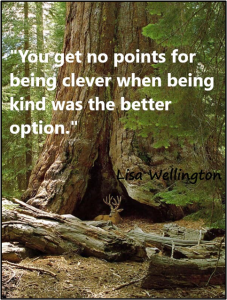
On February 1, 1884: The first portion, or fascicle, of the Oxford English Dictionary (OED), considered the most comprehensive and accurate dictionary of the English language, was published.
Plans for the dictionary began in 1857 when members of London’s Philological Society felt an error free dictionary covering all vocabulary from the Anglo-Saxon period (1150 A.D.) to the present was needed. By 1928 it was completed; all 400,000 words and phrases in 10 volumes.
An effort started in 1984 to digitize this dictionary, and additional supplements, was finally available in 2000 thanks to 120 typists and 50 proofreaders.
So. Many. Words. And, like clothes in our closet, we tend to use just a few.
Words have power and weight, yet we throw them around like little candy grenades at a parade or rattle and flail them like swords. Sometimes they just take up space to satisfy an itch, so we don’t have to experience silence.
They also can be a salve to heal or a lift to encourage. We choose.
Today’s invitation is to be mindful of our spoken word.
There are 3 key considerations that can help us craft what we speak into the world.
- Is it true?
- Is it necessary?
- Is it kind?
Is It True?
Daniel Patrick Moynihan once said, “You are entitled to your opinion. But you are not entitled to your own facts.” Sometimes a blurry line exists between our perception/opinion and the facts on the ground. The facts can of course be viewed differently from opposing perspectives and be true to both parties.
We can also mindlessly enter the slippery slope of spreading rumors, sharing gossip, or exaggerating in ways that cater to our egos and biases. We can talk in ways that just aren’t in alignment with our authentic self and our truest intention to communicate. When speaking, ask yourself, Is this true? And if it’s not, why am I saying it? What am I really trying to communicate by stretching the truth?
Is It Necessary?
It’s important to take a moment to pause and ask ourselves, is it important for me to speak to this topic? Am I just expounding on the obvious? Is this the right time, place, audience? Am I adding value to the conversation? It’s always worth considering, is this necessary right now, in this situation, and are my words succinct and appropriate for the message I want to communicate?
Is It Kind?
When you speak, are you showing empathy? Are you taking into consideration the feelings of others? Are you saying something that will lift the mood or spirits of those who are present? Expressing kindness isn’t about mindless optimism or giving gratuitous compliments: it’s about knowing which words are the most compassionate.
Other times, it means saying what needs to be said but offering only the gentlest phrasing. Always ask, is this kind? Is what I’m about to say expressing compassion?
The goal of mindful speech is not to police our sentences. It’s to occasionally Check-In with our selves; to be conscious of the words that we often take for granted. Being mindful about speech simply means slowing down and choosing our words with care. Is it TRUE? Is it NECESSARY? Is it KIND?
*#@!* A note on swearing: Sometimes a laser focused F-bomb makes sense and seems appropriate.
Here’s an interesting article about the correlation between intelligence and swearing 😊, along with some other possible benefits of cursing.
Bonus note: Regard silence as a part of speech. Holding space for others by withholding our opinion or well-intentioned comments can itself be a gift of true presence.
Deeper Mindfulness Practice and Reflection
- When you thoughtfully assert yourself in conversation with kindness, stay connected to your body. How do you feel physically and emotionally when you’ve extended yourself in kindness, particularly when you had a chance to ‘land a zinger’ but reconsidered?
- If you are faced with confrontation:
- Pause. Take a beat.
- Be intentional about responding and not just reacting.
- Stay in your belly and your heart.
- Let your thoughts self-organize. Notice the choice you’re making.
- Then observe and assess how that feels.
Your nervous system provided you with ample information. Assess then adjust as needed.
You got this!

Lisa Wellington is a Certified Mindfulness Teacher who writes about integrative practices that downshift stress, increase insight, and jumpstart joy.
She is best known for her work with law enforcement professionals as well as those challenged by housing instability and addiction. Trained in the Fine Arts at Washington State University, she specializes in group training that engages participants’ inherent creativity.
If she is not under a stack of books about psychology and spirituality, she can be found at a Puget Sound beach or nearby trail, always searching for the absurd, which is her superpower.
Author: Lynnwood Times Staff












